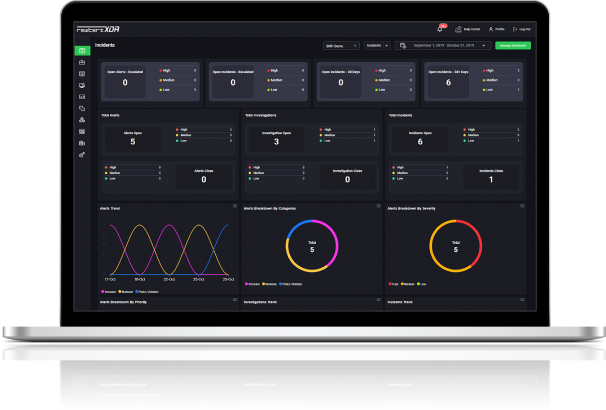

Rewterz Threat Alert – Trickbot Banking Trojan Arrival via Redirection URL
May 22, 2019
Rewterz Threat Advisory – CVE-2019-11815 – Linux Kernel “rds_tcp_kill_sock()” Use-After-Free Vulnerability
May 22, 2019
Rewterz Threat Alert – Trickbot Banking Trojan Arrival via Redirection URL
May 22, 2019
Rewterz Threat Advisory – CVE-2019-11815 – Linux Kernel “rds_tcp_kill_sock()” Use-After-Free Vulnerability
May 22, 2019Severity
High
Analysis Summary
CVE-2019-11691
A use-after-free vulnerability can occur when working with XMLHttpRequest (XHR) in an event loop, causing the XHR main thread to be called after it has been freed. This results in a potentially exploitable crash.
CVE-2019-11699
A malicious page can briefly cause the wrong name to be highlighted as the domain name in the address bar during page navigations. This could result in user confusion of which site is currently loaded for spoofing attacks.
CVE-2019-5798
An out-of-bounds read can occur in the Skia library during path transformations. This could result in the exposure of data stored in memory.
CVE-2019-9816
A possible vulnerability exists where type confusion can occur when manipulating JavaScript objects in object groups, allowing for the bypassing of security checks within these groups.
CVE-2019-9818
A race condition is present in the crash generation server used to generate data for the crash reporter. This issue can lead to a use-after-free in the main process, resulting in a potentially exploitable crash and a sandbox escape.
Note: this vulnerability only affects Windows. Other operating systems are unaffected.
CVE-2019-11692
A use-after-free vulnerability can occur when listeners are removed from the event listener manager while still in use, resulting in a potentially exploitable crash.
CVE-2019-11695
A custom cursor defined by scripting on a site can position itself over the addressbar to spoof the actual cursor when it should not be allowed outside of the primary web content area. This could be used by a malicious site to trick users into clicking on permission prompts, doorhanger notifications, or other buttons inadvertently if the location is spoofed over the user interface.
CVE-2019-11701
The default webcal: protocol handler will load a web site vulnerable to cross-site scripting (XSS) attacks. This default was left in place as a legacy feature and has now been removed. Note: this issue only affects users with an account on the vulnerable service. Other users are unaffected.
(CVE-2019-9800) (CVE-2019-9814)
Memory safety bugs present in Firefox 66 and Firefox ESR 60.6. Some of these bugs showed evidence of memory corruption and we presume that with enough effort that some of these could be exploited to run arbitrary code.
CVE-2019-9815
If hyperthreading is not disabled, a timing attack vulnerability exists, similar to previous Spectre attacks. Apple has shipped macOS 10.14.5 with an option to disable hyperthreading in applications running untrusted code in a thread through a new sysctl. Firefox now makes use of it on the main thread and any worker threads.
CVE-2019-11694
A vulnerability exists in the Windows sandbox where an uninitialized value in memory can be leaked to a renderer from a broker when making a call to access an otherwise unavailable file. This results in the potential leaking of information stored at that memory location.
Note: this issue only occurs on Windows. Other operating systems are unaffected.
CVE-2019-9819
A vulnerability where a JavaScript compartment mismatch can occur while working with the fetch API, resulting in a potentially exploitable crash.
CVE-2019-9820
A use-after-free vulnerability can occur in the chrome event handler when it is freed while still in use. This results in a potentially exploitable crash.
CVE-2019-11697
If the ALT and “a” keys are pressed when users receive an extension installation prompt, the extension will be installed without the install prompt delay that keeps the prompt visible in order for users to accept or decline the installation. A malicious web page could use this with spoofing on the page to trick users into installing a malicious extension.
CVE-2019-11700
A hyperlink using the res: protocol can be used to open local files at a known location in Internet Explorer if a user approves execution when prompted.
Note: this issue only occurs on Windows. Other operating systems are unaffected.
CVE-2018-18511
Cross-origin images can be read from a canvas element in violation of the same-origin policy using the transferFromImageBitmap method.
Note: This only affects Firefox 65. Previous versions are unaffected
CVE-2019-11698
If a crafted hyperlink is dragged and dropped to the bookmark bar or sidebar and the resulting bookmark is subsequently dragged and dropped into the web content area, an arbitrary query of a user’s browser history can be run and transmitted to the content page via drop event data. This allows for the theft of browser history by a malicious site.
CVE-2019-9797
Cross-origin images can be read in violation of the same-origin policy by exporting an image after using createImageBitmap to read the image and then rendering the resulting bitmap image within a canvas element.
CVE-2019-9817
Images from a different domain can be read using a canvas object in some circumstances. This could be used to steal image data from a different site in violation of same-origin policy.
CVE-2019-11696
Files with the .JNLP extension used for “Java web start” applications are not treated as executable content for download prompts even though they can be executed if Java is installed on the local system. This could allow users to mistakenly launch an executable binary locally.
CVE-2019-9821
A use-after-free vulnerability can occur in AssertWorkerThread due to a race condition with shared workers. This results in a potentially exploitable crash.
CVE-2019-7317
A use-after-free vulnerability was discovered in the png_image_free function in the libpng library. This could lead to denial of service or a potentially exploitable crash when a malformed image is processed.
CVE-2019-11693
The bufferdata function in WebGL is vulnerable to a buffer overflow with specific graphics drivers on Linux. This could result in malicious content freezing a tab or triggering a potentially exploitable crash. Note: this issue only occurs on Linux. Other operating systems are unaffected.
Impact
- System access
- Exposure of sensitive information
- Spoofing
- Security Bypass
Affected Vendors
Mozilla
Affected Products
Mozilla Firefox 66.x
Remediation
Upgrade to version 67








